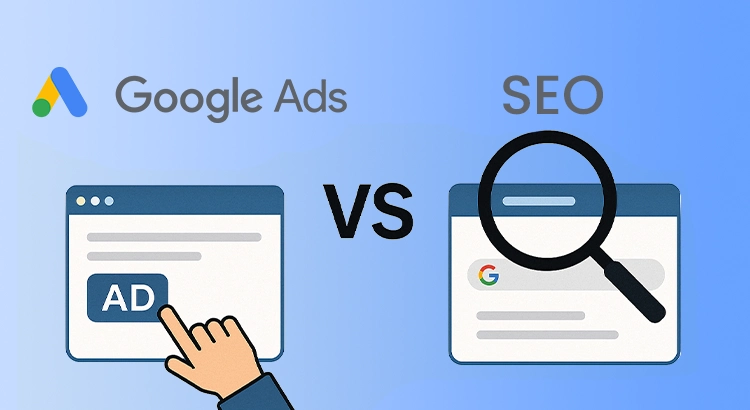Choosing between Google Ads vs SEO can significantly impact how a business grows online. Both methods offer unique advantages when it comes to increasing visibility and attracting traffic. While one is known for quick, paid results, the other focuses on long-term growth through organic discovery. Understanding how these two approaches differ is key to making informed marketing decisions that align with your goals and budget.
This guide breaks down each method, compares their effectiveness across essential factors, and provides a quick-reference comparison table to help you decide the best route for your digital marketing efforts.
What is Google Ads?
It is a paid advertising platform that enables businesses to display their advertisements on search engine result pages and across a vast network of partner websites. Formerly known as Google AdWords, the platform operates on a pay-per-click (PPC) model. Advertisers bid on keywords, and when users search for those terms, relevant advertisements appear prominently.
The ad platform is especially useful for generating immediate visibility and driving targeted traffic. Top Google Ads agencies handle campaign management, helping businesses run effective ads and improve performance. However, it requires ongoing spending, and once the campaign ends, the visibility often stops as well.
What is SEO?
It refers to the process of enhancing a website’s visibility in organic search results through a combination of technical improvements, content relevance, and user experience enhancements. Instead of paying for clicks, website owners invest time and resources into improving their site’s structure, optimizing content, and earning backlinks.
The best SEO companies focus on helping businesses increase their position in search results over time. Although results may take longer to materialize compared to paid campaigns, the benefits are long-lasting and can reduce dependence on paid ads in the long run.
A Comparative Analysis of SEO vs Google AdWords
Understanding how organic ranking efforts and paid advertising platforms differ across key performance areas can guide better marketing decisions. Below is a breakdown of the major factors that influence which approach may suit a business better.
Cost Structure
Running campaigns on the ad platform typically involves paying for each click, which allows for flexible budgeting but can quickly become expensive in competitive niches. In contrast, efforts focused on website optimization require an initial and ongoing investment in content, technical improvements, and outreach, without the pressure of paying per visitor.
Time to Results
Those using pay-per-click advertising see traffic almost immediately once campaigns go live. However, website ranking services take time to build momentum, often requiring several months before substantial improvements in visibility and traffic are noticed.
Sustainability and Longevity
Once a business stops funding its ad campaign, visibility tends to disappear instantly. On the other hand, content created through organic efforts can continue bringing in visitors long after the work is done, offering more sustained value over time.
Click-Through Behavior
Users are often aware of which listings are paid and may scroll past them. Organic results, especially those ranking high on the first page, are generally perceived as more trustworthy, resulting in better click-through rates for many industries.
Level of Control
The ad platform provides granular control over when and where ads appear, allowing for precise audience targeting and budget management. With website optimization, control is less direct, relying more on alignment with search engine algorithms and user intent.
Audience Targeting
AdWords and similar tools offer extensive options to define target audiences based on demographics, interests, location, and device usage. In comparison, organic approaches rely more on strategic keyword targeting and relevant content to match what users are searching for.
Data Insights and Testing
Real-time analytics and fast A/B testing are major strengths of paid advertising. Performance data is immediately available, enabling quick adjustments. With organic work, changes take longer to reflect in rankings and traffic, requiring more patience during optimization.
Quick Overview
| Feature | Google AdWords | Search Engine Optimization |
| Cost | Pay-per-click, ongoing spend | Upfront investment, no cost per click |
| Time to Results | Immediate | Gradual, takes time |
| Sustainability | Ends with campaign | Long-term visibility |
| Click-Through Rate (CTR) | Lower trust, often skipped | Higher trust, more organic clicks |
| Control | High control over targeting and budget | Less control, more reliant on algorithm |
| Targeting | Specific targeting by audience and behavior | Keyword and intent-driven |
| Performance Insights | Real-time metrics and fast testing | Slower feedback loop |
Closing Thoughts
Deciding between the ad platform and website optimization depends on your marketing timeline, goals, and available budget. If your priority is fast exposure and highly targeted campaigns, then investing in AdWords or leveraging the platform can offer quick wins.
On the other hand, if you’re focused on building a long-term digital presence and reducing reliance on paid channels over time, focusing on website optimization is the more sustainable option.
In many cases, a balanced approach using both paid promotion and organic efforts yields the best results. While the platform provides speed and precision, a well-optimized website supports long-term visibility. Align your efforts with your business goals, and you’ll find the right mix to maximize growth.


